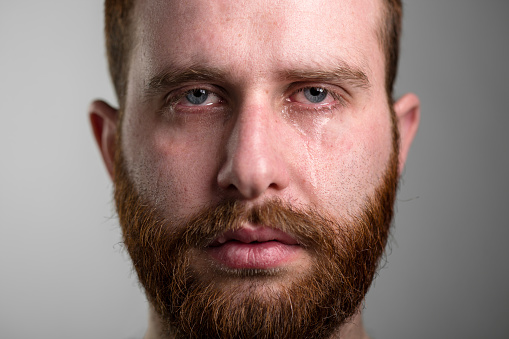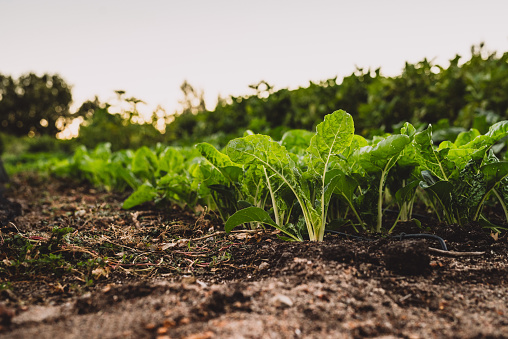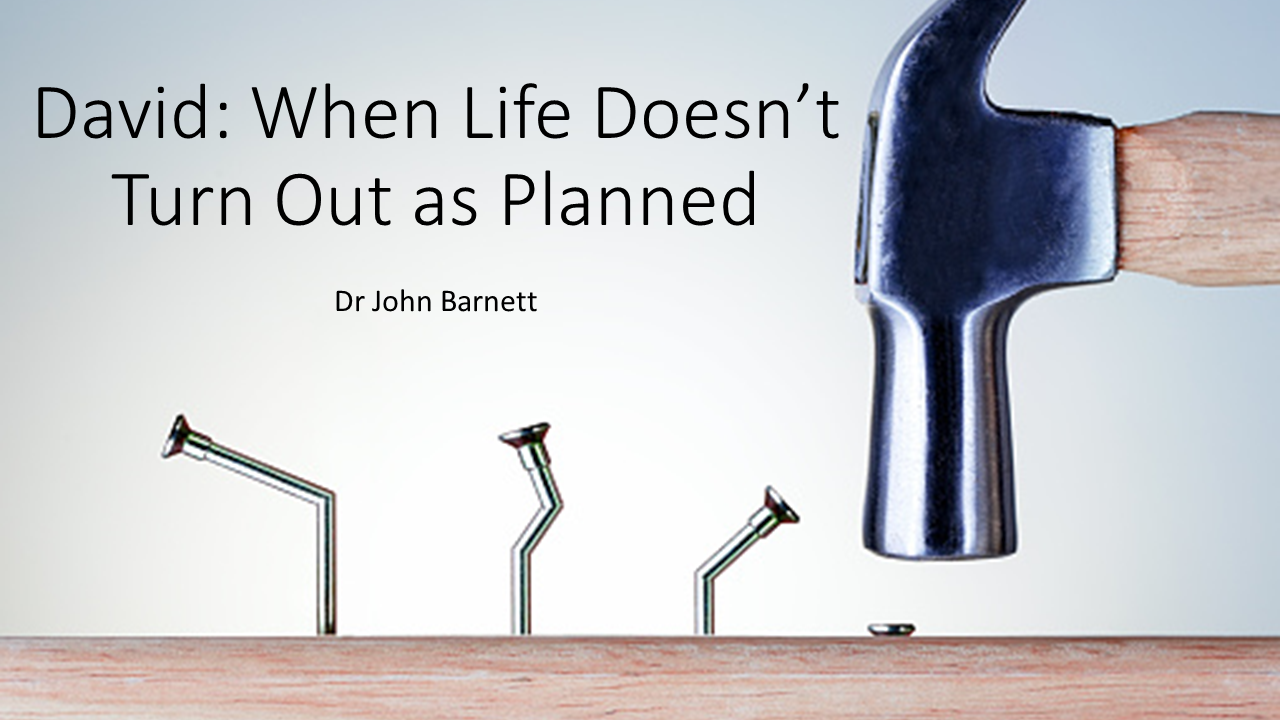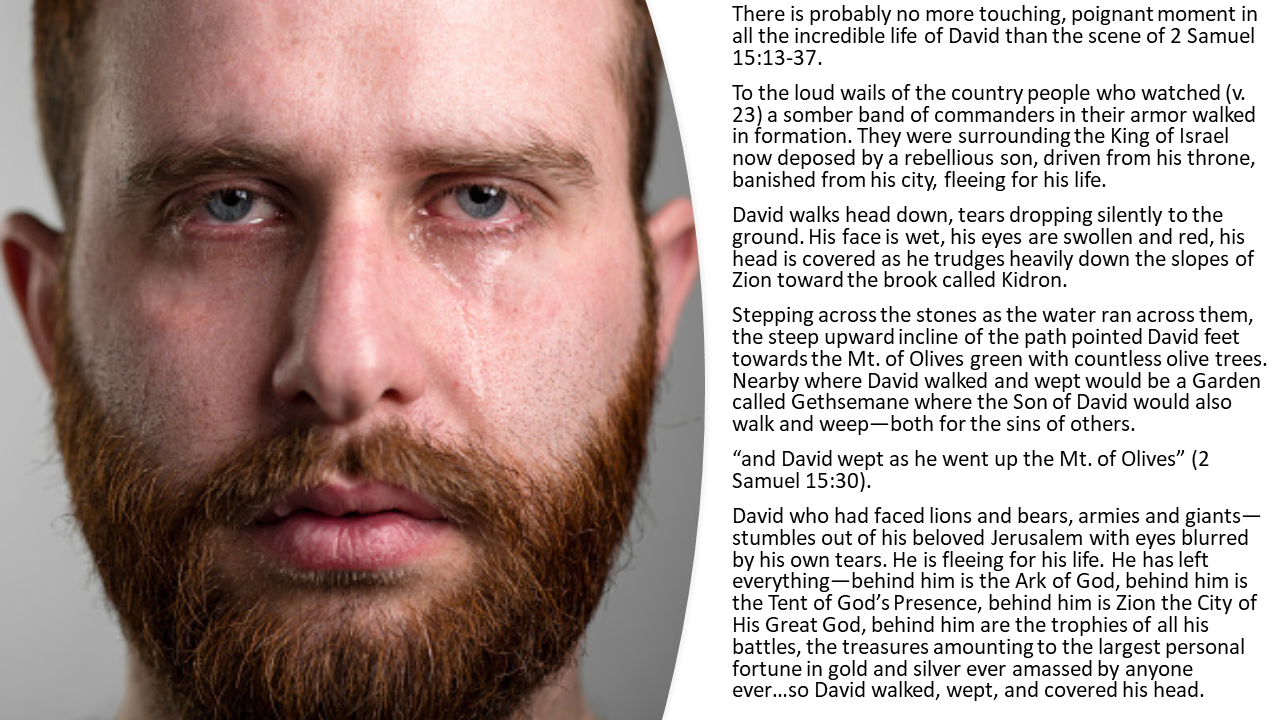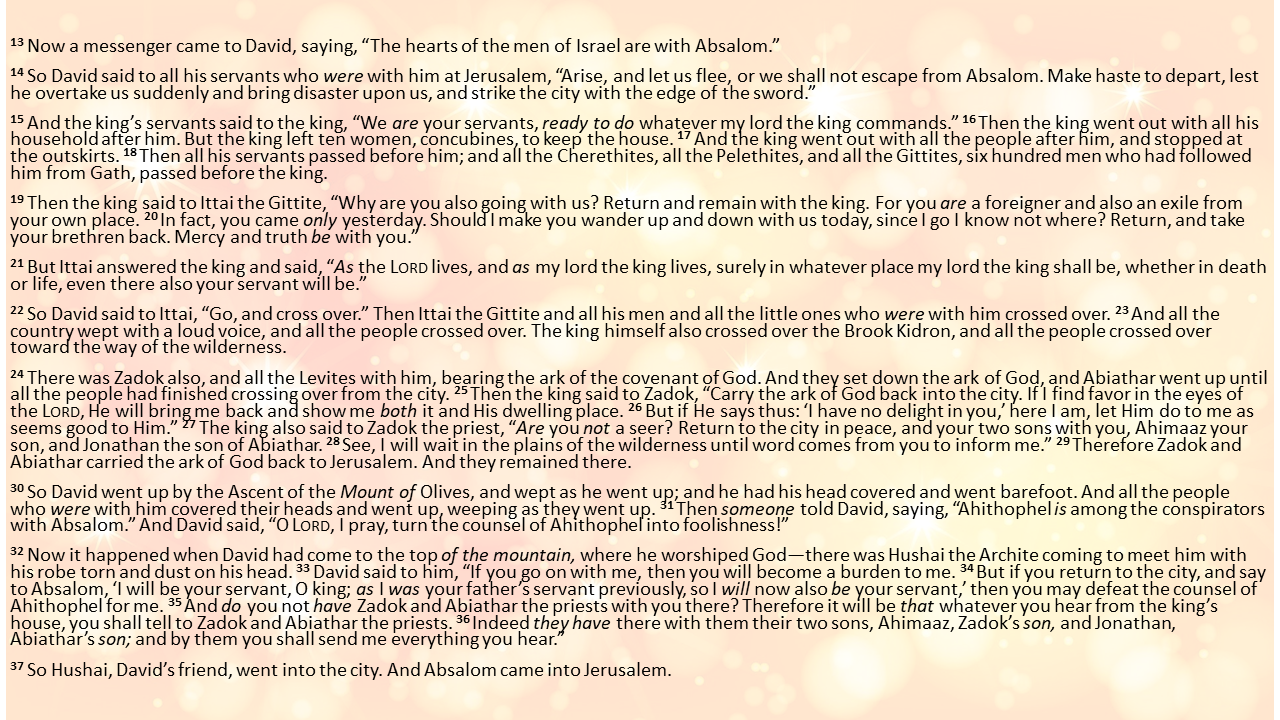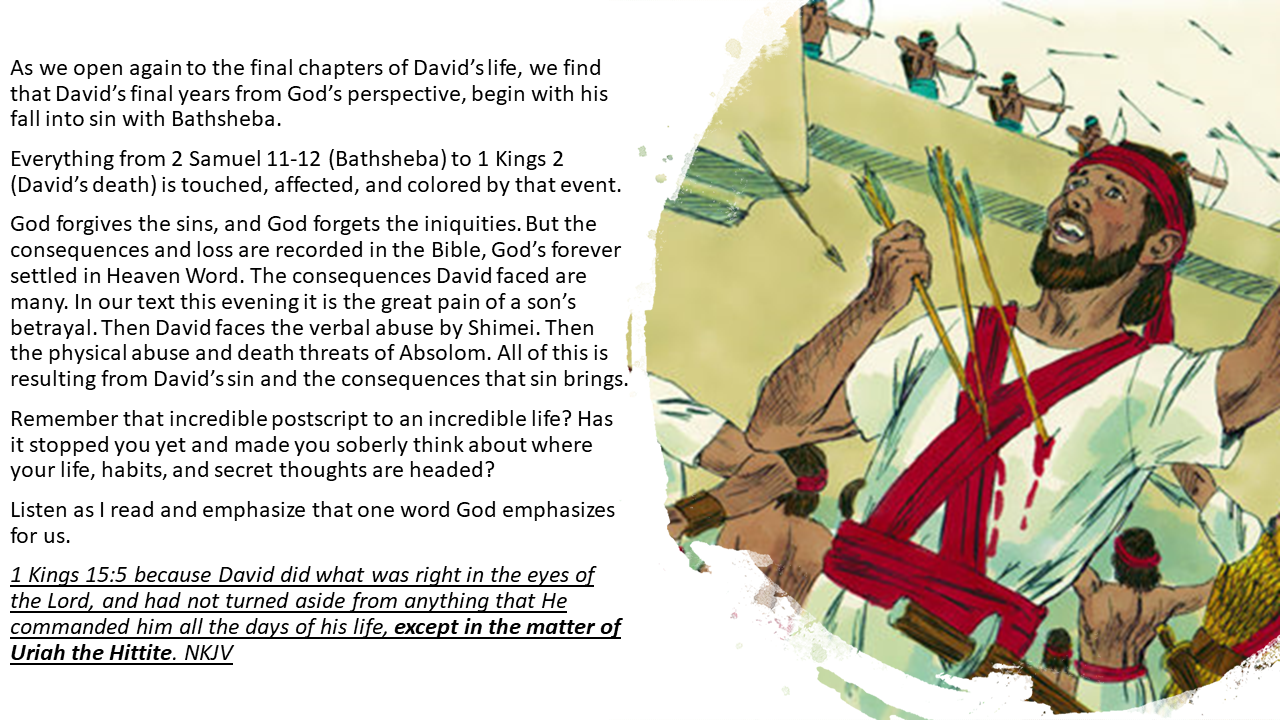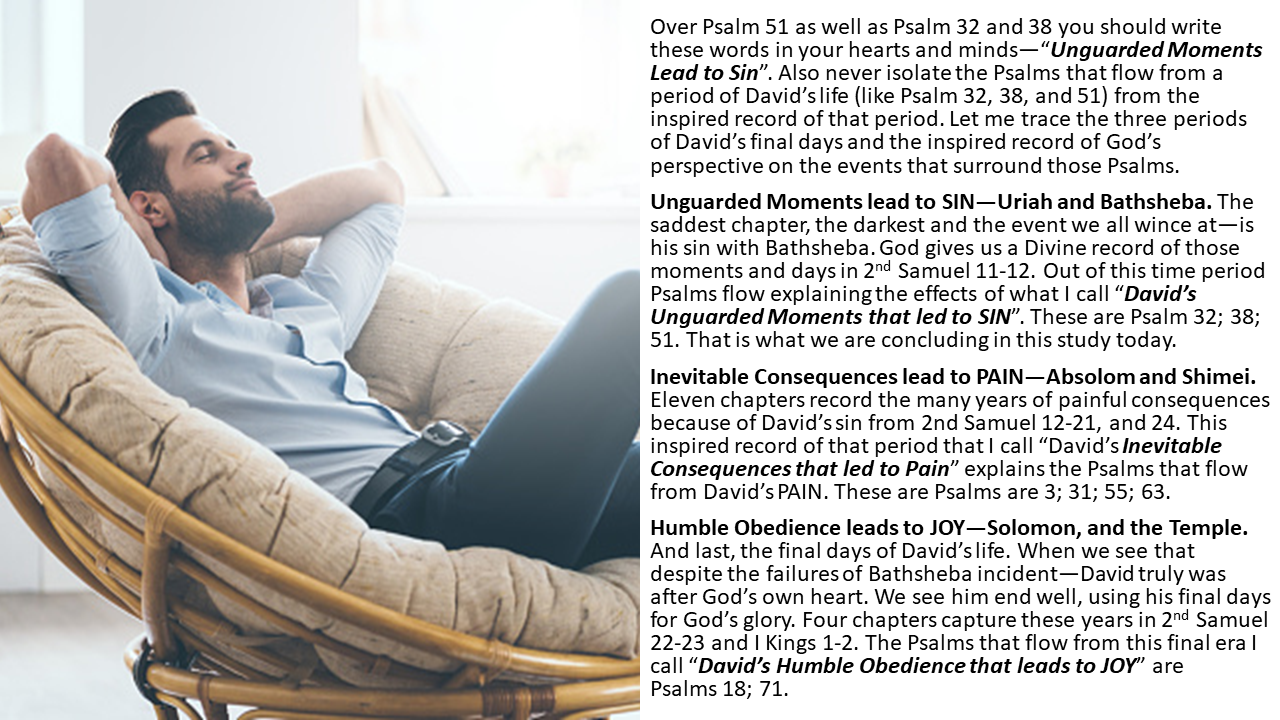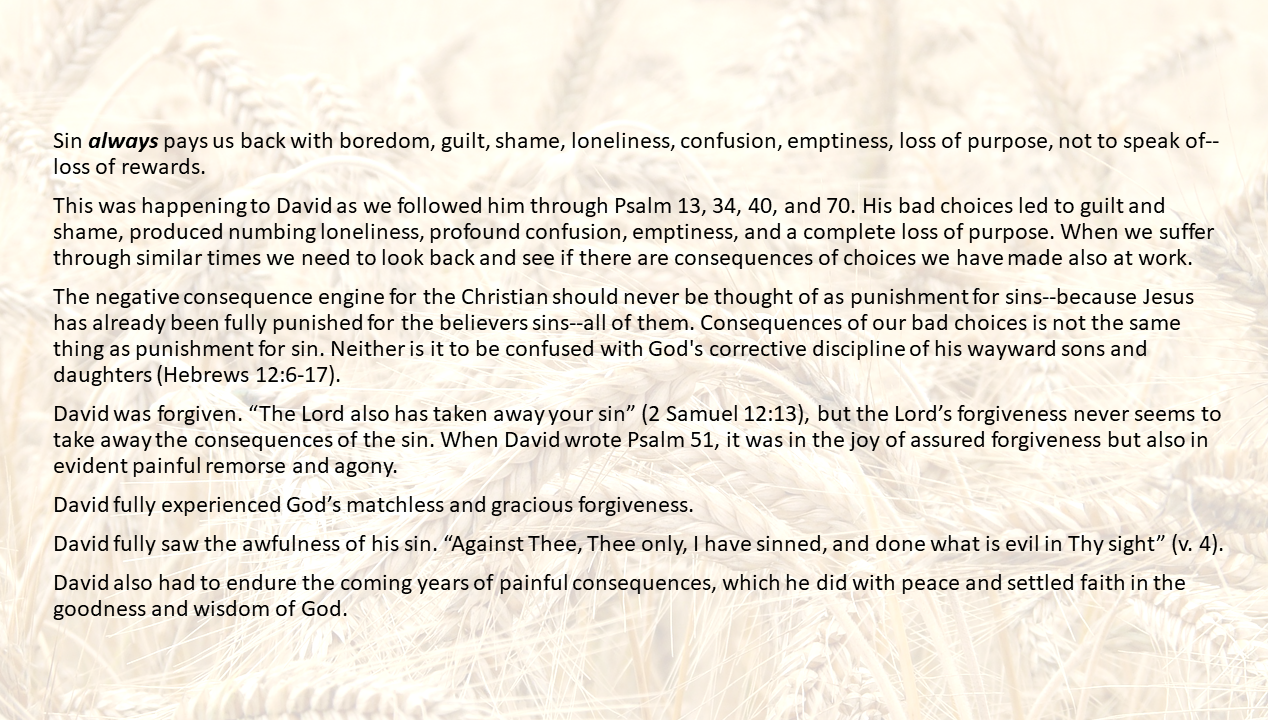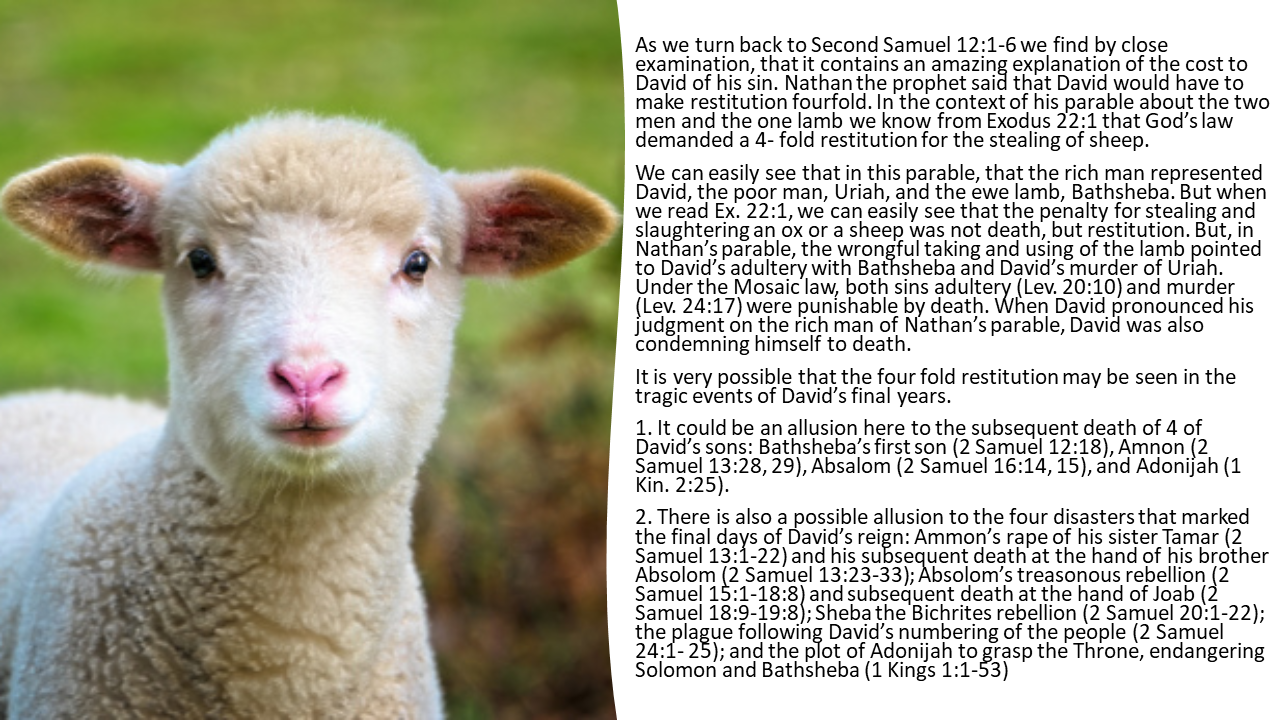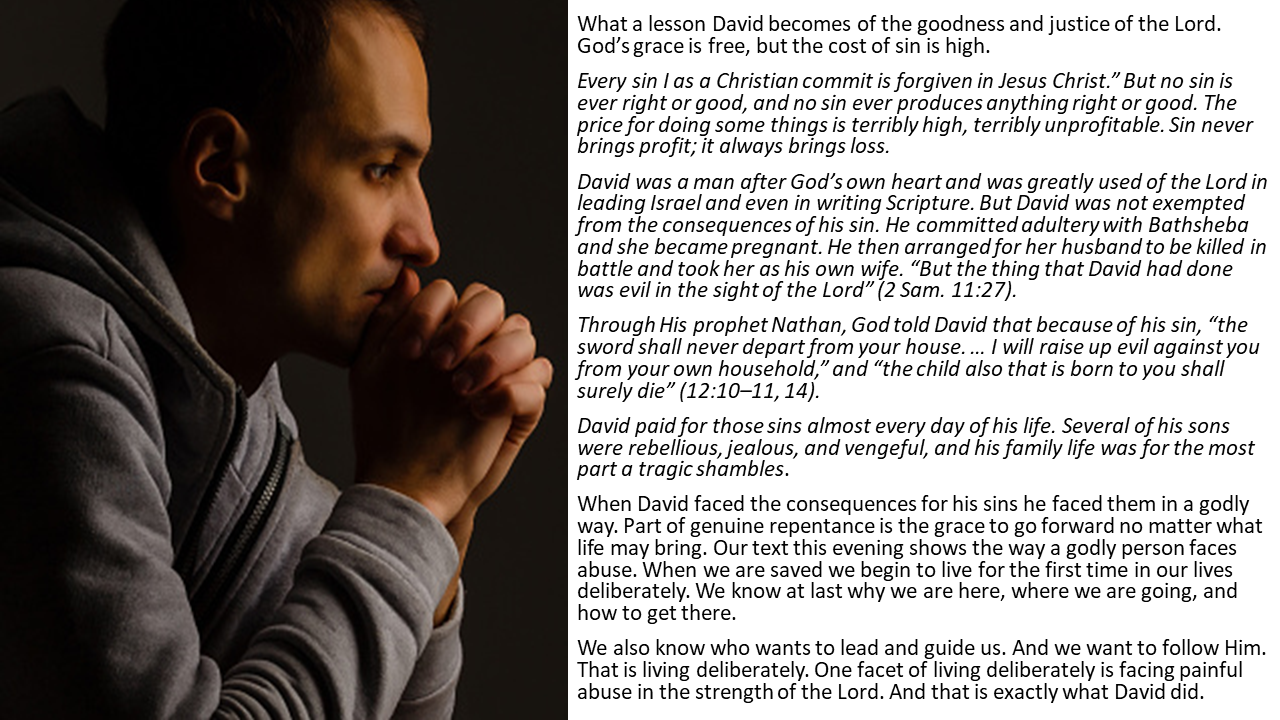If the YouTube video above is not available, here are two other ways to view:
When Life Doesn’t Turn Out
DSS-33
060820PM
Psalm 3
There is probably no more touching, poignant moment in all the incredible life of David than the scene of 2 Samuel 15:13-37.
To the loud wails of the country people who watched (v. 23) a somber band of commanders in their armor walked in formation. They were surrounding the King of Israel now deposed by a rebellious son, driven from his throne, banished from his city, fleeing for his life.
David walks head down, tears dropping silently to the ground. His face is wet, his eyes are swollen and red, his head is covered as he trudges heavily down the slopes of Zion toward the brook called Kidron.
Stepping across the stones as the water ran across them, the steep upward incline of the path pointed David feet towards the Mt. of Olives green with countless olive trees. Nearby where David walked and wept would be a Garden called Gethsemane where the Son of David would also walk and weep—both for the sins of others.
“and David wept as he went up the Mt. of Olives” (2 Samuel 15:30).
David who had faced lions and bears, armies and giants—stumbles out of his beloved Jerusalem with eyes blurred by his own tears. He is fleeing for his life. He has left everything—behind him is the Ark of God, behind him is the Tent of God’s Presence, behind him is Zion the City of His Great God, behind him are the trophies of all his battles, the treasures amounting to the largest personal fortune in gold and silver ever amassed by anyone ever…so David walked, wept, and covered his head.
As we open again to the final chapters of David’s life, we find that David’s final years from God’s perspective, begin with his fall into sin with Bathsheba.
Everything from 2 Samuel 11-12 (Bathsheba) to 1 Kings 2 (David’s death) is touched, affected, and colored by that event.
God forgives the sins, and God forgets the iniquities. But the consequences and loss are recorded in the Bible, God’s forever settled in Heaven Word. The consequences David faced are many. In our text this evening it is the great pain of a son’s betrayal. Then David faces the verbal abuse by Shimei. Then the physical abuse and death threats of Absalom.
All of this is resulting from David’s sin and the consequences that sin brings. Remember that incredible postscript to an incredible life? Has it stopped you yet and made you soberly think about where your life, habits, and secret thoughts are headed?
Listen as I read and emphasize that one word God emphasizes for us.
- 1 Kings 15:5 because David did what was right in the eyes of the Lord, and had not turned aside from anything that He commanded him all the days of his life, except in the matter of Uriah the Hittite. NKJV
Over Psalm 51 as well as Psalm 32 and 38 you should write these words in your hearts and minds—“Unguarded Moments Lead to Sin”. Also never isolate the Psalms that flow from a period of David’s life (like Psalm 32, 38, and 51) from the inspired record of that period. Let me trace the three periods of David’s final days and the inspired record of God’s perspective on the events that surround those Psalms.
Unguarded Moments lead to SIN—Uriah and Bathsheba. The saddest chapter, the darkest and the event we all wince at—is his sin with Bathsheba. God gives us a Divine record of those moments and days in 2nd Samuel 11-12. Out of this time period Psalms flow explaining the effects of what I call “David’s Unguarded Moments that led to SIN”. These are Psalm 32; 38; 51. That is what we are concluding in this study today.
- Inevitable Consequences lead to PAIN—Absalom and Shimei. Eleven chapters record the many years of painful consequences because of David’s sin from 2ndSamuel 12-21, and 24. This inspired record of that period that I call “David’s Inevitable Consequences that led to Pain” explains the Psalms that flow from David’s PAIN. These are Psalms are 3; 31; 55; 63.
- Humble Obedience leads to JOY—Solomon, and the Temple. And last, the final days of David’s life. When we see that despite the failures of Bathsheba incident—David truly was after God’s own heart. We see him end well, using his final days for God’s glory. Four chapters capture these years in 2nd Samuel 22-23 and I Kings 1-2. The Psalms that flow from this final era I call “David’s Humble Obedience that leads to JOY” are Psalms 18; 71.
There are lessons to be learned from David that are very difficult but so necessary. For any and all of us today ring Paul’s words across the twisted wreckage of so many lives that litter the highway of the redeemed—
- Galatians 6:7-9 Do not be deceived, God is not mocked; for whatever a man sows, that he will also reap. 8 For he who sows to his flesh will of the flesh reap corruption, but he who sows to the Spirit will of the Spirit reap everlasting life. 9 And let us not grow weary while doing good, for in due season we shall reap if we do not lose heart.
Although we often forget about it, both halves of this verse impact all of us. In reality, most Christians find we may still be reaping the unpleasant long-term consequences of past bad choices and at the same time, as forgiven sinners, we are probably also sowing to the Spirit for a future positive harvest.
Sin always pays us back with boredom, guilt, shame, loneliness, confusion, emptiness, loss of purpose, not to speak of–loss of rewards.
This was happening to David as we followed him through Psalm 13, 34, 40, and 70. His bad choices led to guilt and shame, produced numbing loneliness, profound confusion, emptiness, and a complete loss of purpose. When we suffer through similar times we need to look back and see if there are consequences of choices we have made also at work.
The negative consequence engine for the Christian should never be thought of as punishment for sins–because Jesus has already been fully punished for the believer’s sins–all of them. Consequences of our bad choices is not the same thing as punishment for sin. Neither is it to be confused with God’s corrective discipline of his wayward sons and daughters (Hebrews 12:6-17).
David was forgiven. “The Lord also has taken away your sin” (2 Samuel 12:13), but the Lord’s forgiveness never seems to take away the consequences of the sin.
When David wrote Psalm 51, it was in the joy of assured forgiveness but also in evident painful remorse and agony.
- David fully experienced God’s matchless and gracious forgiveness.
- David fully saw the awfulness of his sin. “Against Thee, Thee only, I have sinned, and done what is evil in Thy sight” (v. 4).
- David also had to endure the coming years of painful consequences, which he did with peace and settled faith in the goodness and wisdom of God.
As we turn back to Second Samuel 12:1-6 we find by close examination, that it contains an amazing explanation of the cost to David of his sin. Nathan the prophet said that David would have to make restitution fourfold. In the context of his parable about the two men and the one lamb we know from Exodus 22:1 that God’s law demanded a 4-fold restitution for the stealing of sheep.
We can easily see that in this parable, that the rich man represented David, the poor man, Uriah, and the ewe lamb, Bathsheba. But when we read Ex. 22:1, we can easily see that the penalty for stealing and slaughtering an ox or a sheep was not death, but restitution. But, in Nathan’s parable, the wrongful taking and using of the lamb pointed to David’s adultery with Bathsheba and David’s murder of Uriah. Under the Mosaic law, both sins adultery (Lev. 20:10) and murder (Lev. 24:17) were punishable by death. When David pronounced his judgment on the rich man of Nathan’s parable, David was also condemning himself to death.
Four Fold Restitution
It is very possible that the four fold restitution may be seen in the tragic events of David’s final years.
- It could be an allusion here to the subsequent death of 4 of David’s sons: Bathsheba’s first son (2 Samuel 12:18), Amnon (2 Samuel 13:28,29), Absalom (2 Samuel 16:14,15), and Adonijah (1 Kin. 2:25).
- There is also a possible allusion to the four disasters that marked the final days of David’s reign: Ammon’s rape of his sister Tamar (2 Samuel 13:1-22) and his subsequent death at the hand of his brother Absalom (2 Samuel 13:23-33); Absalom’s treasonous rebellion (2 Samuel 15:1-18:8) and subsequent death at the hand of Joab (2 Samuel 18:9-19:8); Sheba the Bichrites rebellion (2 Samuel 20:1-22); the plague following David’s numbering of the people (2 Samuel 24:1-25); and the plot of Adonijah to grasp the Throne, endangering Solomon and Bathsheba (1 Kings 1:1-53).
What a lesson David becomes of the goodness and justice of the Lord. God’s grace is free, but the cost of sin is high.
Every sin I as a Christian commit is forgiven in Jesus Christ.” But no sin is ever right or good, and no sin ever produces anything right or good. The price for doing some things is terribly high, terribly unprofitable. Sin never brings profit; it always brings loss.
David was a man after God’s own heart and was greatly used of the Lord in leading Israel and even in writing Scripture. But David was not exempted from the consequences of his sin. He committed adultery with Bathsheba and she became pregnant. He then arranged for her husband to be killed in battle and took her as his own wife. “But the thing that David had done was evil in the sight of the Lord” (2 Sam. 11:27).
Through His prophet Nathan, God told David that because of his sin, “the sword shall never depart from your house. … I will raise up evil against you from your own household,” and “the child also that is born to you shall surely die” (12:10-11, 14).
David paid for those sins almost every day of his life. Several of his sons were rebellious, jealous, and vengeful, and his family life was for the most part a tragic shambles.[1]
When David faced the consequences for his sins he faced them in a godly way. Part of genuine repentance is the grace to go forward no matter what life may bring. Our text this evening shows the way a godly person faces abuse. When we are saved we begin to live for the first time in our lives deliberately. We know at last why we are here, where we are going, and how to get there.
We also know who wants to lead and guide us. And we want to follow Him. That is living deliberately. One facet of living deliberately is facing painful abuse in the strength of the Lord. And that is exactly what David did.
[1] MacArthur, John F., The MacArthur New Testament Commentary I Corinthians 6:12 , (Chicago: Moody Press) 1983, in loc.
Slides
Check Out All The Sermons In The Series
You can find all the sermons and short clips from this series, David’s Spiritual Secret here.
Looking To Study The Bible Like Dr. Barnett?
Dr. Barnett has curated an Amazon page with a large collection of resources he uses in his study of God’s Word. You can check it out here.

